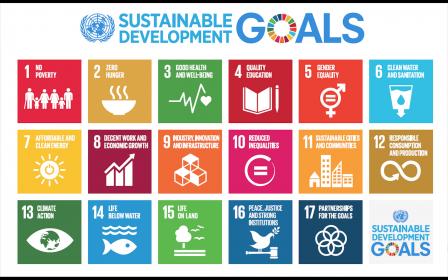Social Responsibility Strategy at WUT
Between September 25 and 27, 2015, leaders of the United Nations member countries signed the document "Transforming Our World: The 2030 Agenda for Sustainable Development."
This document encompasses 17 Sustainable Development Goals and 169 associated actions intended to be achieved by all parties involved – governments, international organizations, non-governmental organizations, the academic and business sectors, as well as citizens. They revolve around 5 areas: people, planet, prosperity, peace, and partnership.
Sustainable Development Goals – SDGs constitute a plan of action for transforming and reshaping the world, where the needs of the present generation can be met sustainably, with respect for the environment and consideration for the needs of future generations (see the graphic nearby). They form the basis of the new 2030 Agenda for Sustainable Development worldwide, encompassing economic, social, and environmental aspects. This plan identifies the most critical challenges of our time, presenting a vision for building a better world for the benefit of the planet's inhabitants and its restoration.
More at: https://www.un.org/sustainabledevelopment/
Social Responsibility Strategy of the Warsaw University of Technology
Social Responsibility Strategy of the Warsaw University of Technology was adopted by Resolution No. 113/L/2021 of the Senate of the Warsaw University of Technology on June 23, 2021, regarding the acceptance of the Social Responsibility Strategy of the Warsaw University of Technology until 2030
Declaration of the Social Responsibility of the University
- Uphold academic values outlined in documents such as the "Code of Ethics for Scientific Staff," especially conscientiousness, objectivity, independence, openness, and transparency.
- Foster social and civic attitudes in future elites that contribute to community building, creativity, openness, communication, social sensitivity, and work culture.
- Promote the ideals of equality, diversity, tolerance, and respect for human rights within the entire academic community and its surroundings.
- Expand educational programs to include topics related to ethics and social responsibility in business, sustainable development, and social innovation.
- Implement projects that enforce principles of social responsibility, particularly those related to diversity management in the workplace, employee volunteering, the promotion of ethical principles, intersectoral cooperation, and socially engaged marketing.
- Undertake scientific research and implementation work, contributing, through partnerships with academic institutions worldwide, businesses, public administration, and non-governmental organizations, to solving significant social problems.
- Develop inter-university, national, and international cooperation to adapt and strengthen best practices in university social responsibility.
- Ensure the organizational order of the university, basing university management on the foundations of social responsibility, both in strategic documents and in actions aimed at the comprehensive development of the academic community and the effective fulfillment of the university's mission.
- Ensure transparency in the university's activities through, among other things, measuring results, promoting and disseminating achievements, and identifying the person or team coordinating these activities.
- Conduct activities in a manner that minimizes the negative impact of the academic community's activities and its stakeholders on the natural environment in all its dimensions.
- Engage in a dialogue with stakeholders regarding the priorities of the university's social responsibility policy and inform about its results.
- Follow ethical principles and responsibility in the process of teaching and conducting scientific research to ensure optimal conditions for stakeholders to benefit from the knowledge, intellectual capital, and achievements of the university.
Strategic Goals of the Warsaw University of Technology in the area of Social Responsibility of the University:
University that cares about the natural environment.
1. Supporting research with a positive impact on the natural environment.
2. Implementing solutions to protect the natural environment in all aspects of the University's functioning
Diverse and engaged community.
- Increasing the accessibility of the University to stakeholders (including international students and individuals with special needs, including persons with disabilities).
- Enhancing engagement and participation in the University community through the efficient circulation of information.
- Building a socially responsible culture within the academic community.
- Combating negative phenomena in the workplace and during studies.
Socially impactful scientific research.
- Supporting research with a significant influence on improving the quality of life.
- Introducing issues related to social responsibility into research areas.
Socially responsible students.
1. Promoting the idea of social responsibility in educational programs.
2. Incorporating topics related to professional ethics and sustainable development into educational programs.
3. Supporting the development of competencies and shaping social attitudes of students and doctoral students.
Competent, aware, and satisfied employees.
1. Ensuring conditions for continuous improvement of competencies and development of employees.
2. Monitoring and increasing employee satisfaction.
3. Promoting and supporting health-conscious attitudes.
Active university in collaboration with external stakeholders.
1. Increasing the role of external stakeholders in the life of the University.
2. Integrating graduates with the WUT community.
3. Creating an ecosystem for the development of sustainable entrepreneurship.
 PJM
PJM
